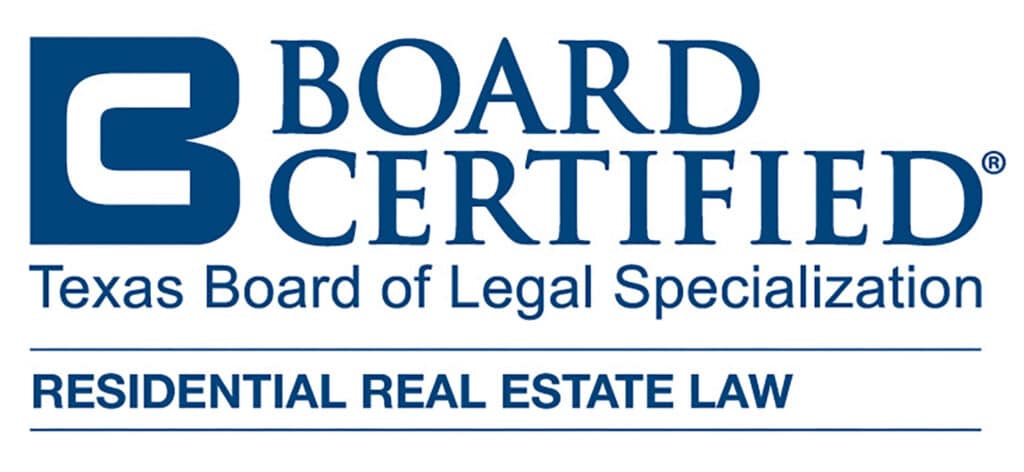
When a person who owns a house dies, the house cannot be transferred or sold until the deceased’s name has been removed from the property title. If the deceased owner did not have a Will or other estate plan in place, a Texas Affidavit of Heirship may be needed to identify the heirs of the property. An Affidavit of Heirship is a sworn statement that identifies the heirs of a deceased property owner. Good to know: By Texas law, all property owned by the deceased passes to the Heirs at Law of the deceased unless there is a valid Will or other estate plan in place stating otherwise. Once the affidavit has been recorded, the heirs are identified in the property records as the new owners of the property. Thereafter, the heir or heirs may transfer or sell the property if they choose to do so. At that point, the deed most commonly used to transfer the property is a General Warranty Deed.

 A brown book with Real Estate Law lettering with gavel atop for Texas Property Deeds" width="500" height="262" />
A brown book with Real Estate Law lettering with gavel atop for Texas Property Deeds" width="500" height="262" />

The purpose of this legal document is to officially identify the living heirs of a deceased property owner so that those living heirs can transfer or finance the property if they wish. It is the document used to “put the property in the name of the heirs.” Before a deed can be used to transfer or sell the property, the affidavit should be prepared, signed, notarized, and filed in the deed records office in the county where the property is located.
Note: The affidavit should be recorded in the deed records first to identify the heirs. Alternatively, the affidavit may be recorded at the same time as a property deed is recorded.
Once this is done, the property records will be updated to show the heirs as the new owners of the property. Thereafter, they may transfer or sell the property title if they chose to. Good to know: An Affidavit of Heirship alone does not transfer property title. It identifies the heirs of the property.
Questions? Email Scott directly for a quick response.An Affidavit of Heirship for a house is generally used when real estate is titled in the name of a property owner who died without a Will, or other estate plan for their real estate property such as a Survivorship Agreement, a Life Estate Deed or a Transfer on Death Deed. Even if the deceased had a Will, an Heirship Affidavit may be used rather than probating the Will if the Will leaves the property solely to the direct descendants of the deceased.
Note: Using this affidavit may be a less expensive and quicker option for title transfer of real property compared to a probate proceeding. Also, probate could cost well over $3000 and take many months.
Meanwhile, we prepare an Affidavit of Heirship for $300. In most cases, once we have the information needed, your document can be emailed to you the same day.
Good to know: A Will may only be probated within 4 years of the death of a property owner in most cases.
If this timeframe has lapsed, an Affidavit of Heirship may be a useful alternative as it can be filed at any time.
If a person owns real estate in Texas and dies outside of Texas, you may still need to file an Affidavit of Heirship with the County Clerk where the property is located. Documents filed outside of Texas may have no effect on Texas property. If the deceased owner had a Will that has been probated in another state or country, you may be required to file certified copies of the court documents from the other state or country in Texas. This process is called Ancillary Probate. The proceeding may be needed for assets such as Texas real estate when a property owner lived outside of Texas at the time he or she died. Or, you may simply be able to file an Affidavit of Heirship. Good to know: A Will probated in another state does not change title to Texas real estate property until it is probated in Texas. You will need to either file the Will in Texas as an Ancillary Probate or you may be able to file an Affidavit of Heirship.
The real estate property named in an Heirship Affidavit may also be referred to as Heir Property. Texas Heir Property is generally inherited by the Heirs at Law. Usually Heir Property is property that a parent or a grandparent inherited. In such cases, one or more Affidavits of Heirship may be necessary. Most title companies require an Affidavit of Heirship for each deceased property owner. Sometimes a person may inherit an interest in Heirship Property that they do not want. There could be a number of reasons for this including:
If this is the case, that heir will need to sign a deed to transfer his or her share to another person.

Specific information is needed to determine the identity of the Heirs at Law of the Heir Property.
A properly prepared Texas Affidavit of Heirship must provide the following information:
In order to qualify as a valid Heirship Affidavit, the document needs to be signed in front of a notary public by three people that knew the deceased for at least 10 years.
It can be signed in front of a notary anywhere in the world. It does not have to be signed at the same time or at the same place.
One of the three people signing can be an heir, but the other two should not be heirs.
The Affidavit should also state:
This last fact is critical because the government may claim a Medicaid lien on the property.
Good to know: In order to be accepted by a title company as a valid Affidavit of Heirship, the document needs to be signed under oath and contain a perjury clause, such as:
“I am aware of the penalties of perjury under Federal Law, which includes the execution of a false affidavit, pursuant to 18 U.S.C.S., Section 1621 wherein it is provided that anyone found guilty shall not be fined more than $2,000 or imprisoned not more than 5 years or both. I am also aware that perjury in the execution of a false affidavit is a criminal act pursuant to Section 37.02 of the Texas Penal Code. Finally I am also aware that under Section 32.46 of the Texas Penal Code, a person commits an offense, if with intent to defraud or harm a person, he, by deception, causes another to sign or execute any document affecting property or service of the pecuniary interest of any person, and that an offense under such Section is a felony of the third degree which is punishable by a fine of $2,000 and confinement in the Texas Department of Corrections for a term of not more than 10 years or less than 2 years”
If the Affidavit of Heirship does not include these required items, a title company or mortgage company may not accept it and may require a new Affidavit of Heirship.
Using a properly recorded Affidavit of Heirship, the Texas property records and the property tax records are updated to transfer the property from the deceased’s name to the names of the heirs at law without probate.
Note: The affidavit alone does not transfer title, but it is used so that the name on the property records and tax records is changed to the names of the heirs.
Good to know: An Affidavit of Heirship establishes a clean chain of title. It ensures that the title records of the Heir Property title changes legally to the heirs of the deceased. Subsequently, this document is used to complete the title chain link from the deceased owner to the heirs.
Once the Affidavit of Heirship is prepared:
1. An Affidavit of Heirship. A document which is a sworn statement that legally identifies the heirs of a deceased person.
2. A Deed. This document will transfer property title if one or more of the identified heirs want to transfer or sell their interest in the property. In most cases, the deed needed for this transfer is a General Warranty Deed.
Good to know: Keep in mind that the Affidavit of Heirship alone does not transfer property title. Also, that the Affidavit should be recorded first to identify the heirs. Alternatively, you may record both the affidavit and the deed at the same time.